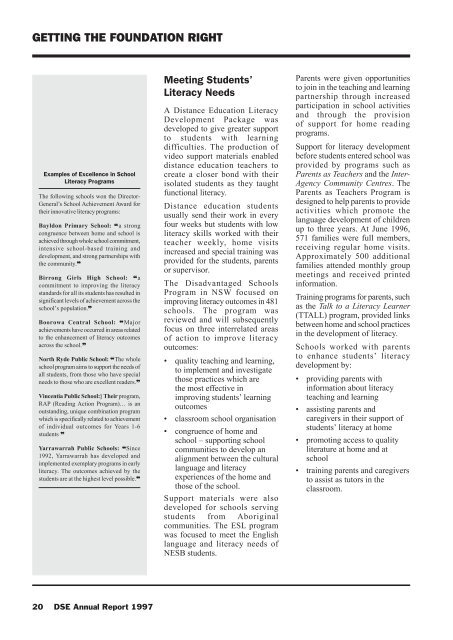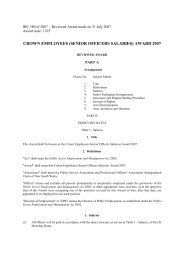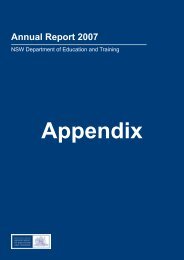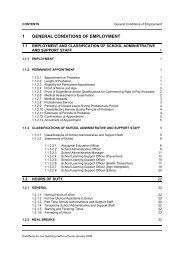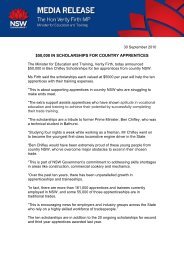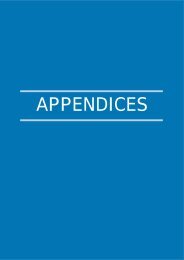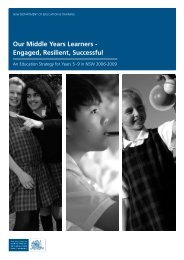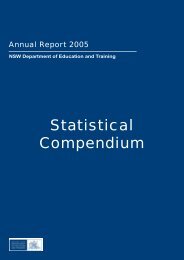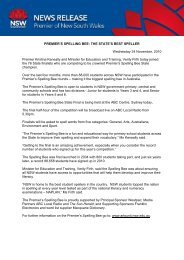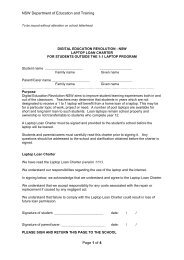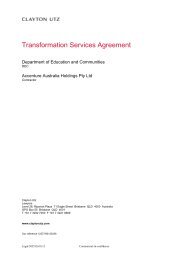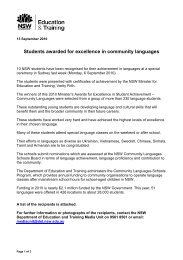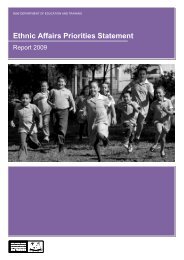01 - Department of Education and Communities - NSW Government
01 - Department of Education and Communities - NSW Government
01 - Department of Education and Communities - NSW Government
You also want an ePaper? Increase the reach of your titles
YUMPU automatically turns print PDFs into web optimized ePapers that Google loves.
GETTING THE FOUNDATION RIGHTExamples <strong>of</strong> Excellence in SchoolLiteracy ProgramsThe following schools won the Director-General’s School Achievement Award fortheir innovative literacy programs:Bayldon Primary School: ❝a strongcongruence between home <strong>and</strong> school isachieved through whole school commitment,intensive school-based training <strong>and</strong>development, <strong>and</strong> strong partnerships withthe community.❞Birrong Girls High School: ❝acommitment to improving the literacyst<strong>and</strong>ards for all its students has resulted insignificant levels <strong>of</strong> achievement across theschool’s population.❞Boorowa Central School: ❝Majorachievements have occurred in areas relatedto the enhancement <strong>of</strong> literacy outcomesacross the school.❞North Ryde Public School: ❝The wholeschool program aims to support the needs <strong>of</strong>all students, from those who have specialneeds to those who are excellent readers.❞Vincentia Public School:} Their program,RAP (Reading Action Program)… is anoutst<strong>and</strong>ing, unique combination programwhich is specifically related to achievement<strong>of</strong> individual outcomes for Years 1-6students ❞Yarrawarrah Public Schools: ❝Since1992, Yarrawarrah has developed <strong>and</strong>implemented exemplary programs in earlyliteracy. The outcomes achieved by thestudents are at the highest level possible.❞Meeting Students’Literacy NeedsA Distance <strong>Education</strong> LiteracyDevelopment Package wasdeveloped to give greater supportto students with learningdifficulties. The production <strong>of</strong>video support materials enableddistance education teachers tocreate a closer bond with theirisolated students as they taughtfunctional literacy.Distance education studentsusually send their work in everyfour weeks but students with lowliteracy skills worked with theirteacher weekly, home visitsincreased <strong>and</strong> special training wasprovided for the students, parentsor supervisor.The Disadvantaged SchoolsProgram in <strong>NSW</strong> focused onimproving literacy outcomes in 481schools. The program wasreviewed <strong>and</strong> will subsequentlyfocus on three interrelated areas<strong>of</strong> action to improve literacyoutcomes:• quality teaching <strong>and</strong> learning,to implement <strong>and</strong> investigatethose practices which arethe most effective inimproving students’ learningoutcomes• classroom school organisation• congruence <strong>of</strong> home <strong>and</strong>school – supporting schoolcommunities to develop analignment between the culturallanguage <strong>and</strong> literacyexperiences <strong>of</strong> the home <strong>and</strong>those <strong>of</strong> the school.Support materials were alsodeveloped for schools servingstudents from Aboriginalcommunities. The ESL programwas focused to meet the Englishlanguage <strong>and</strong> literacy needs <strong>of</strong>NESB students.Parents were given opportunitiesto join in the teaching <strong>and</strong> learningpartnership through increasedparticipation in school activities<strong>and</strong> through the provision<strong>of</strong> support for home readingprograms.Support for literacy developmentbefore students entered school wasprovided by programs such asParents as Teachers <strong>and</strong> the Inter-Agency Community Centres. TheParents as Teachers Program isdesigned to help parents to provideactivities which promote thelanguage development <strong>of</strong> childrenup to three years. At June 1996,571 families were full members,receiving regular home visits.Approximately 500 additionalfamilies attended monthly groupmeetings <strong>and</strong> received printedinformation.Training programs for parents, suchas the Talk to a Literacy Learner(TTALL) program, provided linksbetween home <strong>and</strong> school practicesin the development <strong>of</strong> literacy.Schools worked with parentsto enhance students’ literacydevelopment by:• providing parents withinformation about literacyteaching <strong>and</strong> learning• assisting parents <strong>and</strong>caregivers in their support <strong>of</strong>students’ literacy at home• promoting access to qualityliterature at home <strong>and</strong> atschool• training parents <strong>and</strong> caregiversto assist as tutors in theclassroom.20 DSE Annual Report 1997


